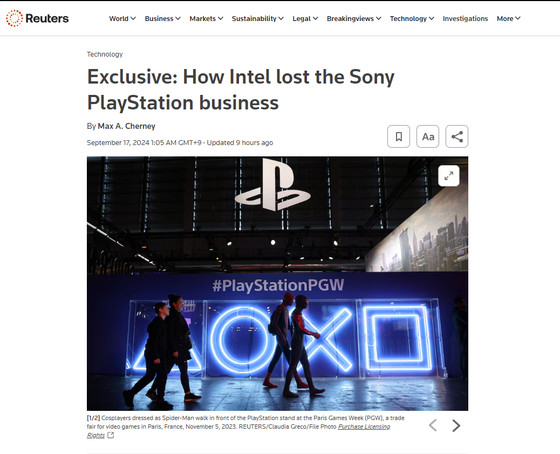AMD reportedly wins contract to design PlayStation 6 chips, Intel loses

Sony's PlayStation 5 is equipped with AMD's 8-core Zen 2 custom CPU and AMD's custom GPU based on the RDNA 2 architecture. It has been reported that Intel and AMD have competed against each other for the contract for the chip to be installed in the next-generation game console, the PlayStation 6, which will be the successor to the PlayStation 5, and that AMD has ultimately won the contract.
Exclusive: How Intel lost the Sony PlayStation business | Reuters

Sony reportedly picked AMD over Intel for the PS6 - The Verge
https://www.theverge.com/2024/9/16/24246234/playstation-6-rumor-sony-intel-amd
Intel reportedly lost PlayStation 6 chip design contract to AMD in 2022 — the $30 billion deal was up for grabs | Tom's Hardware
https://www.tomshardware.com/video-games/playstation/intel-reportedly-lost-playstation-6-chip-design-contract-to-amd-in-2022-the-dollar30-billion-deal-failed-probably-because-arc-gpus-have-a-lot-to-prove
According to Reuters, Intel, AMD, Broadcom and other manufacturers are competing for a contract to design semiconductors for Sony's next-generation game console, and the competition has been narrowed down to just Intel and AMD as of 2022.
For Intel, the contract was expected to bring significant benefits to both its design and foundry businesses and was a central part of CEO Pat Gelsinger's transformation plan. Intel estimated that the contract could generate approximately $30 billion in revenue over five years. In addition, the contract win was expected to help Intel promote its 18A process node, which it had staked its fortunes on, to major customers.
However, Intel got bogged down in negotiations with Sony over profit margins and ultimately lost out on the deal. Reuters reports that AMD's advantage is that it is easier to maintain backward compatibility because it also handles the current PlayStation 5 chips. In fact, maintaining compatibility between console generations is very important because it allows users to play previous versions of games on new hardware.

The loss of this contract is likely to be a further blow to Intel, which missed out on the NVIDIA-led AI chip boom and is also struggling to launch its foundry business, while AMD is adapting to market changes by focusing on data center products and rethinking its gaming GPU strategy.
While Sony has yet to officially announce the PlayStation 6, the deal ensures that the next-generation console's chips will be designed by AMD, Reuters reported.
An Intel spokesman responded to the Reuters report, saying: 'We strongly disagree with this language, but we don't comment on negotiations with current or prospective customers. We have very healthy connections with our customers in both our products and foundry business, and we are focused on innovating to meet their needs.'
Related Posts:







